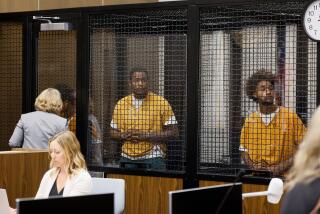6 cops shot a rapper more than 20 times. The death renews scrutiny of Vallejo police
- Share via
The Vallejo Police Department has released the names of six officers involved in the fatal shooting of an aspiring rapper in a Taco Bell drive-thru, including one who was involved in the shooting death of another man last year.
Authorities said the half-dozen officers fired their guns because they feared for their safety after Willie McCoy suddenly moved and reached for a gun that was on his lap. Police had been called to the eatery because employees reported a man was “slumped over” in the driver’s seat of a silver Mercedes-Benz that was in the restaurant’s drive-thru.
The officers were identified as Ryan McMahon, Collin Eaton, Bryan Glick, Jordon Patzer, Anthony Romero-Cano and Mark Thompson, the Vallejo Police Department said this week.
McMahon was also involved in the 2018 death of Ronell Foster and is facing a lawsuit by civil rights attorney John Burris in connection with that shooting.
All six officers named in McCoy’s death were placed on administrative leave after the Feb. 9 shooting but are expected to return to work within a week, said Vallejo police spokesman Jeff Tai.
Burris, who is also representing McCoy’s family, said the man was shot more than 20 times. The aspiring rapper had just finished a recording session at a studio before grabbing a bite to eat at the fast-food restaurant, cousin David Harrison said. The 20-year-old had fallen asleep in the car, he said.
The death has sparked outrage among community members in the Bay Area and renewed scrutiny of the Vallejo Police Department. McCoy’s family said his death is another example of police brutality against black men.
“What the community is coming into contact with is some type of squad in the Vallejo Police Department targeting young black men for execution,” Harrison said.
In the Foster case, Burris alleges that the 32-year-old was riding his bicycle in Vallejo in March 2018 when McMahon and another officer followed him. When he got off his bike and ran away, the officers chased him and struck him on the head with a flashlight before firing a Taser at him, according to the lawsuit.
Police say Foster attacked McMahon with his flashlight, but Burris insists that McMahon fatally shot Foster in the back and the back of his head while he was running away.
In a news release last week about McCoy’s shooting, Vallejo police said officers had planned to open the car’s door and grab the firearm they had spotted, but the door was locked. Officers said the car’s transmission was in drive so patrol vehicles were being moved to keep the car from moving.
As they were positioning a cruiser behind McCoy’s vehicle, he began moving and looked at the uniformed officers, authorities said.
Officers asked him several times to put his hands up, but he moved his hands downward, police said, prompting the lethal response. The six fired multiple rounds, and McCoy was declared dead at the scene.
Burris said he is seeking legal action against the Vallejo Police Department for a handful of cases, including one involving an officer who pulled his gun on a motorcyclist and forcefully detained another man for recording the incident.
He said that he plans to file a suit next week against the six officers who fired their guns at McCoy.
“I’ve had my concern about the Vallejo Police Department for a while now,” Burris said. “It may all be coming to a head now, but we’ve had a lot of cases through the years.”
McCoy’s death has also sparked questions about police decisions to fire at unconscious people. In March, Oakland police officers fired at Joshua Pawlik, who had been lying unconscious on the ground between two houses with a handgun nearby, according to another lawsuit filed by Burris against the Police Department. He had been unresponsive for 45 minutes but eventually woke up and moved. The lawsuit says Pawlik did not reach for the gun.
At a recent Vallejo City Council meeting, McCoy’s girlfriend tearfully asked for body camera footage of the shooting to be released. “This hurts me so much,” the woman said. “He wasn’t going to harm nobody. My baby was an angel. … The police is just killing everybody.”
A state law passed last year requires departments to release body-work camera and other video and audio recordings of officer shootings and serious use of force within 45 days, unless doing so would interfere with an ongoing investigation.
Peter Bibring , police practices director of the ACLU’s California branch, issued a statement last week following McCoy’s death: “This is a matter of life and death: California can and must update its deadly use of force laws and provide officers with adequate guidance to successfully resolve situations like the one that resulted in Mr. McCoy’s death without anyone dying.”
“This is something new for us,” said Vallejo Police Chief Andrew Bidou, addressing viewers for what he said was the first time, in a video release. “It’s not lost on me or any member of our department that we’re discussing a loss of life. Our condolences and prayers go out to the family of the deceased.”
The Vallejo Police Department said it is working closely with the Solano County district attorney’s office on an in-depth investigation of McCoy’s shooting.
alejandra.reyesvelarde@latimes.com
Twitter: @r_valejandra
More to Read
Sign up for Essential California
The most important California stories and recommendations in your inbox every morning.
You may occasionally receive promotional content from the Los Angeles Times.










